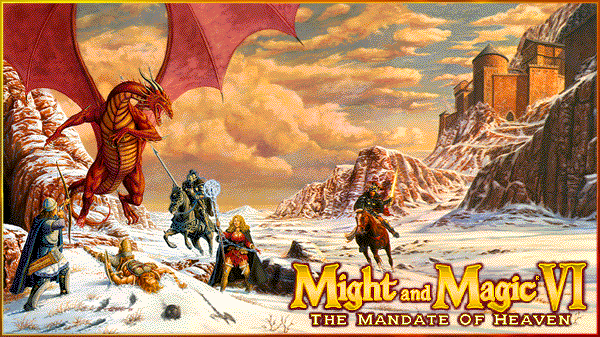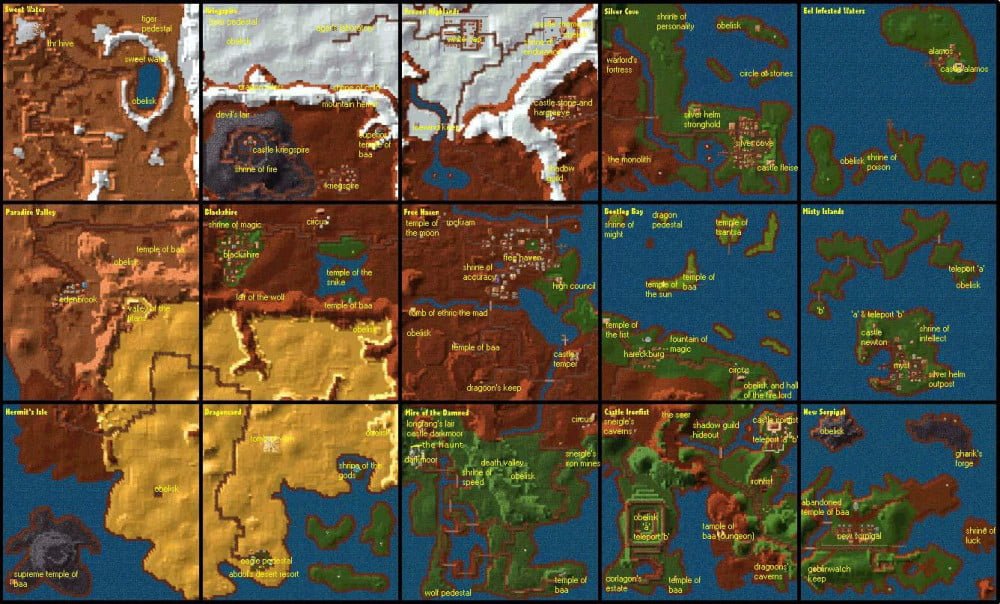 1998 will be remembered for a number of things. I hope that Might and Magic VI: The Mandate of Heaven is one of them. This spectacular franchise sports a rich and enduring lore, even after the departure of its original developer: New World Computing.
1998 will be remembered for a number of things. I hope that Might and Magic VI: The Mandate of Heaven is one of them. This spectacular franchise sports a rich and enduring lore, even after the departure of its original developer: New World Computing.
As of this writing, there are 10 installments in the series (11 if you count the one-off Dark Messiah episode). If one of these had to shine above all others, it would be part six…the focus of this review. Might and Magic VI (MM6) pioneered many features of the modern RPG:
A sophisticated party system with up to six members (4 player characters plus 2 NPCs).
An interactive drag-and-drop inventory system, including innovative potion crafting.
An enormous world map with varied terrain to rival any of today’s epic titles.
A host of melee, spell-casting, and social skills in which to train and master. A half-decade before the advent of Steam (and its ubiquitous achievements), I played MM6 more than my eventual forays into Dragon Age, Elder Scrolls, and Witcher…combined! It was simply that good. While parts VII and later were technically improved, they felt rushed and incomplete; their reviews came up mixed. Parts I through VI however were nearly perfect for their respective times.
A half-decade before the advent of Steam (and its ubiquitous achievements), I played MM6 more than my eventual forays into Dragon Age, Elder Scrolls, and Witcher…combined! It was simply that good. While parts VII and later were technically improved, they felt rushed and incomplete; their reviews came up mixed. Parts I through VI however were nearly perfect for their respective times.
 MM6 was the first in the series to offer real-time combat as an option over the traditional turn-based style. I found the new invention to favor AI unfairly, so decided to stick with the older system. Besides, it’s simply more fun to pause, catch your breath and stare your enemy down a bit while deciding how each party member should act. When approached by a group of denizens, look for one who is physically larger or wearing a different-colored outfit. This denotes a boss of some sort, and you should reposition your party accordingly.
MM6 was the first in the series to offer real-time combat as an option over the traditional turn-based style. I found the new invention to favor AI unfairly, so decided to stick with the older system. Besides, it’s simply more fun to pause, catch your breath and stare your enemy down a bit while deciding how each party member should act. When approached by a group of denizens, look for one who is physically larger or wearing a different-colored outfit. This denotes a boss of some sort, and you should reposition your party accordingly.
Special effects such as rain and snow had not yet been perfected. Sometimes you’ll notice the sky has turned grey to indicate overcast weather, or become completely black for night. For me, this was hardly an issue, due to the superlative writing and story flow.
One of the greatest improvements over earlier episodes is the interactive inventory. To equip an item, simply drag and drop from the backpack directly to your character. To unequip, return the item to the backpack. Flowers and other plants can be similarly dropped into glass vials to create potions of different colors, and therefore effective.
 Perhaps the most innovative feature of MM6 is its skills system. There are social skills such as Learning and Diplomacy, as well as numerous melee and spell-casting abilities. Skills are honed at three levels: Normal, Expert, and Master. You must locate NPC teachers who, for a fee will train your characters.
Perhaps the most innovative feature of MM6 is its skills system. There are social skills such as Learning and Diplomacy, as well as numerous melee and spell-casting abilities. Skills are honed at three levels: Normal, Expert, and Master. You must locate NPC teachers who, for a fee will train your characters. Beginning in Might and Magic VII, a fourth skill level was introduced: Grandmaster. This was unfortunately wrought with problems. For example, the Master-level teacher was located on the opposite side of the world from the Grandmaster. So it was a tedious jaunt every time one of your characters’ Master skills was ready for an upgrade. Another issue was that these later games were actually shorter in play hours than MM6, and so made little use of the Grandmaster level before their respective conclusions.
Beginning in Might and Magic VII, a fourth skill level was introduced: Grandmaster. This was unfortunately wrought with problems. For example, the Master-level teacher was located on the opposite side of the world from the Grandmaster. So it was a tedious jaunt every time one of your characters’ Master skills was ready for an upgrade. Another issue was that these later games were actually shorter in play hours than MM6, and so made little use of the Grandmaster level before their respective conclusions.
So why, you may ask are we reviewing this game 17 years after its initial release? The answer is simple…it’s the only legacy episode to come FREE when you purchase UbiSoft‘s Might and Magic X Legacy: Deluxe Digital Edition in the UPlay shop! This is not a sales pitch by any means. Personally, I see it the opposite way…I buy MM6 and receive MMXL-DDE for free. In any case, below is a useful link if you decide to join us in loving this franchise.
-Chris Roberts-
I’m an autistic gamer with ADHD, studying Business Administration at the University of the People while learning game development. For over 10 years, I’ve reviewed games, collaborated on projects at global game jams, and attended industry conferences. I love growing with others through our shared passion. Always learning, always pushing forward — sometimes you just have to do something crazy.
- Daniel Clatworthy
- Daniel Clatworthy
- Daniel Clatworthy
- Daniel Clatworthy
- Daniel Clatworthy
- Daniel Clatworthy
- Daniel Clatworthy
- Daniel Clatworthy
- Daniel Clatworthy
- Daniel Clatworthy
- Daniel Clatworthy
- Daniel Clatworthy
- Daniel Clatworthy
- Daniel Clatworthy
- Daniel Clatworthy
- Daniel Clatworthy
- Daniel Clatworthy
- Daniel Clatworthy
- Daniel Clatworthy
- Daniel Clatworthy
- Daniel Clatworthy
- Daniel Clatworthy
- Daniel Clatworthy
- Daniel Clatworthy
- Daniel Clatworthy
- Daniel Clatworthy
- Daniel Clatworthy
- Daniel Clatworthy
- Daniel Clatworthy
- Daniel Clatworthy
- Daniel Clatworthy
- Daniel Clatworthy
- Daniel Clatworthy
- Daniel Clatworthy
- Daniel Clatworthy
- Daniel Clatworthy
- Daniel Clatworthy
- Daniel Clatworthy
- Daniel Clatworthy
- Daniel Clatworthy
- Daniel Clatworthy
- Daniel Clatworthy
- Daniel Clatworthy
- Daniel Clatworthy
- Daniel Clatworthy
- Daniel Clatworthy
- Daniel Clatworthy
- Daniel Clatworthy
- Daniel Clatworthy
- Daniel Clatworthy
- Daniel Clatworthy
- Daniel Clatworthy
- Daniel Clatworthy
- Daniel Clatworthy
- Daniel Clatworthy
- Daniel Clatworthy
- Daniel Clatworthy
- Daniel Clatworthy
- Daniel Clatworthy
- Daniel Clatworthy
- Daniel Clatworthy
- Daniel Clatworthy
- Daniel Clatworthy
- Daniel Clatworthy
- Daniel Clatworthy
- Daniel Clatworthy
- Daniel Clatworthy
- Daniel Clatworthy
- Daniel Clatworthy
- Daniel Clatworthy
- Daniel Clatworthy
- Daniel Clatworthy
- Daniel Clatworthy
- Daniel Clatworthy
- Daniel Clatworthy
- Daniel Clatworthy
- Daniel Clatworthy
- Daniel Clatworthy
- Daniel Clatworthy
- Daniel Clatworthy
- Daniel Clatworthy
- Daniel Clatworthy
- Daniel Clatworthy
- Daniel Clatworthy
- Daniel Clatworthy
- Daniel Clatworthy
- Daniel Clatworthy
- Daniel Clatworthy
- Daniel Clatworthy
- Daniel Clatworthy
- Daniel Clatworthy
- Daniel Clatworthy
- Daniel Clatworthy
- Daniel Clatworthy
- Daniel Clatworthy
- Daniel Clatworthy
- Daniel Clatworthy
- Daniel Clatworthy
- Daniel Clatworthy
- Daniel Clatworthy
- Daniel Clatworthy
- Daniel Clatworthy
- Daniel Clatworthy
- Daniel Clatworthy
- Daniel Clatworthy
- Daniel Clatworthy
- Daniel Clatworthy
- Daniel Clatworthy
- Daniel Clatworthy
- Daniel Clatworthy
- Daniel Clatworthy
- Daniel Clatworthy
- Daniel Clatworthy
- Daniel Clatworthy
- Daniel Clatworthy
- Daniel Clatworthy
- Daniel Clatworthy
- Daniel Clatworthy
- Daniel Clatworthy
- Daniel Clatworthy
- Daniel Clatworthy
- Daniel Clatworthy
- Daniel Clatworthy
- Daniel Clatworthy
- Daniel Clatworthy
- Daniel Clatworthy
- Daniel Clatworthy
- Daniel Clatworthy
- Daniel Clatworthy
- Daniel Clatworthy
- Daniel Clatworthy
- Daniel Clatworthy
- Daniel Clatworthy
- Daniel Clatworthy
- Daniel Clatworthy
- Daniel Clatworthy
- Daniel Clatworthy
- Daniel Clatworthy
- Daniel Clatworthy
- Daniel Clatworthy
- Daniel Clatworthy
- Daniel Clatworthy
- Daniel Clatworthy
- Daniel Clatworthy
- Daniel Clatworthy
- Daniel Clatworthy
- Daniel Clatworthy
- Daniel Clatworthy
- Daniel Clatworthy
- Daniel Clatworthy
- Daniel Clatworthy
- Daniel Clatworthy
- Daniel Clatworthy
- Daniel Clatworthy
- Daniel Clatworthy
- Daniel Clatworthy
- Daniel Clatworthy
- Daniel Clatworthy
- Daniel Clatworthy
- Daniel Clatworthy
- Daniel Clatworthy
- Daniel Clatworthy
- Daniel Clatworthy
- Daniel Clatworthy
- Daniel Clatworthy
- Daniel Clatworthy
- Daniel Clatworthy
- Daniel Clatworthy
- Daniel Clatworthy
- Daniel Clatworthy
- Daniel Clatworthy
- Daniel Clatworthy
- Daniel Clatworthy
- Daniel Clatworthy
- Daniel Clatworthy
- Daniel Clatworthy
- Daniel Clatworthy
- Daniel Clatworthy
- Daniel Clatworthy
- Daniel Clatworthy
- Daniel Clatworthy
- Daniel Clatworthy
- Daniel Clatworthy
- Daniel Clatworthy
- Daniel Clatworthy
- Daniel Clatworthy
- Daniel Clatworthy
- Daniel Clatworthy
- Daniel Clatworthy
- Daniel Clatworthy
- Daniel Clatworthy
- Daniel Clatworthy
- Daniel Clatworthy
- Daniel Clatworthy
- Daniel Clatworthy
- Daniel Clatworthy
- Daniel Clatworthy
- Daniel Clatworthy
- Daniel Clatworthy
- Daniel Clatworthy
- Daniel Clatworthy
- Daniel Clatworthy
- Daniel Clatworthy
- Daniel Clatworthy
- Daniel Clatworthy
- Daniel Clatworthy
- Daniel Clatworthy
- Daniel Clatworthy
- Daniel Clatworthy
- Daniel Clatworthy
- Daniel Clatworthy
- Daniel Clatworthy
- Daniel Clatworthy
- Daniel Clatworthy
- Daniel Clatworthy
- Daniel Clatworthy
- Daniel Clatworthy
- Daniel Clatworthy
- Daniel Clatworthy
- Daniel Clatworthy
- Daniel Clatworthy
- Daniel Clatworthy
- Daniel Clatworthy
- Daniel Clatworthy
- Daniel Clatworthy
- Daniel Clatworthy
- Daniel Clatworthy
- Daniel Clatworthy
- Daniel Clatworthy
- Daniel Clatworthy
- Daniel Clatworthy
- Daniel Clatworthy
- Daniel Clatworthy
- Daniel Clatworthy
- Daniel Clatworthy
- Daniel Clatworthy
- Daniel Clatworthy
- Daniel Clatworthy
- Daniel Clatworthy
- Daniel Clatworthy
- Daniel Clatworthy
- Daniel Clatworthy
- Daniel Clatworthy
- Daniel Clatworthy
- Daniel Clatworthy
- Daniel Clatworthy
- Daniel Clatworthy
- Daniel Clatworthy
- Daniel Clatworthy
- Daniel Clatworthy
- Daniel Clatworthy
- Daniel Clatworthy
- Daniel Clatworthy
- Daniel Clatworthy
- Daniel Clatworthy
- Daniel Clatworthy
- Daniel Clatworthy
- Daniel Clatworthy
- Daniel Clatworthy
- Daniel Clatworthy
- Daniel Clatworthy
- Daniel Clatworthy
- Daniel Clatworthy
- Daniel Clatworthy
- Daniel Clatworthy
- Daniel Clatworthy
- Daniel Clatworthy
- Daniel Clatworthy
- Daniel Clatworthy
- Daniel Clatworthy
- Daniel Clatworthy
- Daniel Clatworthy
- Daniel Clatworthy
- Daniel Clatworthy
- Daniel Clatworthy
- Daniel Clatworthy
- Daniel Clatworthy
- Daniel Clatworthy
- Daniel Clatworthy
- Daniel Clatworthy
- Daniel Clatworthy
- Daniel Clatworthy
- Daniel Clatworthy
- Daniel Clatworthy
- Daniel Clatworthy
- Daniel Clatworthy
- Daniel Clatworthy
- Daniel Clatworthy
- Daniel Clatworthy
- Daniel Clatworthy
- Daniel Clatworthy
- Daniel Clatworthy
- Daniel Clatworthy
- Daniel Clatworthy
- Daniel Clatworthy
- Daniel Clatworthy
- Daniel Clatworthy
- Daniel Clatworthy
- Daniel Clatworthy
- Daniel Clatworthy
- Daniel Clatworthy
- Daniel Clatworthy
- Daniel Clatworthy
- Daniel Clatworthy
- Daniel Clatworthy
- Daniel Clatworthy
- Daniel Clatworthy
- Daniel Clatworthy
- Daniel Clatworthy
- Daniel Clatworthy
- Daniel Clatworthy
- Daniel Clatworthy
- Daniel Clatworthy
- Daniel Clatworthy
- Daniel Clatworthy
- Daniel Clatworthy
- Daniel Clatworthy
- Daniel Clatworthy
- Daniel Clatworthy
- Daniel Clatworthy
- Daniel Clatworthy
- Daniel Clatworthy
- Daniel Clatworthy
- Daniel Clatworthy
- Daniel Clatworthy
- Daniel Clatworthy
- Daniel Clatworthy
- Daniel Clatworthy
- Daniel Clatworthy
- Daniel Clatworthy
- Daniel Clatworthy
- Daniel Clatworthy
- Daniel Clatworthy
- Daniel Clatworthy
- Daniel Clatworthy
- Daniel Clatworthy
- Daniel Clatworthy
- Daniel Clatworthy
- Daniel Clatworthy
- Daniel Clatworthy
- Daniel Clatworthy
- Daniel Clatworthy
- Daniel Clatworthy
- Daniel Clatworthy
- Daniel Clatworthy
- Daniel Clatworthy
- Daniel Clatworthy
- Daniel Clatworthy
- Daniel Clatworthy
- Daniel Clatworthy
- Daniel Clatworthy
- Daniel Clatworthy
- Daniel Clatworthy
- Daniel Clatworthy
- Daniel Clatworthy
- Daniel Clatworthy
- Daniel Clatworthy
- Daniel Clatworthy
- Daniel Clatworthy
- Daniel Clatworthy
- Daniel Clatworthy
- Daniel Clatworthy
- Daniel Clatworthy
- Daniel Clatworthy
- Daniel Clatworthy
- Daniel Clatworthy
- Daniel Clatworthy
- Daniel Clatworthy
- Daniel Clatworthy
- Daniel Clatworthy
- Daniel Clatworthy
- Daniel Clatworthy
- Daniel Clatworthy
- Daniel Clatworthy
- Daniel Clatworthy
- Daniel Clatworthy
- Daniel Clatworthy
- Daniel Clatworthy
- Daniel Clatworthy
- Daniel Clatworthy
- Daniel Clatworthy
- Daniel Clatworthy
- Daniel Clatworthy
- Daniel Clatworthy
- Daniel Clatworthy
- Daniel Clatworthy
- Daniel Clatworthy
- Daniel Clatworthy
- Daniel Clatworthy
- Daniel Clatworthy
- Daniel Clatworthy
- Daniel Clatworthy
- Daniel Clatworthy
- Daniel Clatworthy
- Daniel Clatworthy
- Daniel Clatworthy
- Daniel Clatworthy
Share this:
- Share on Facebook (Opens in new window) Facebook
- Email a link to a friend (Opens in new window) Email
- Share on LinkedIn (Opens in new window) LinkedIn
- Share on Reddit (Opens in new window) Reddit
- Share on X (Opens in new window) X
- Share on Tumblr (Opens in new window) Tumblr
- Share on Threads (Opens in new window) Threads
- Share on Mastodon (Opens in new window) Mastodon
- Share on Bluesky (Opens in new window) Bluesky
